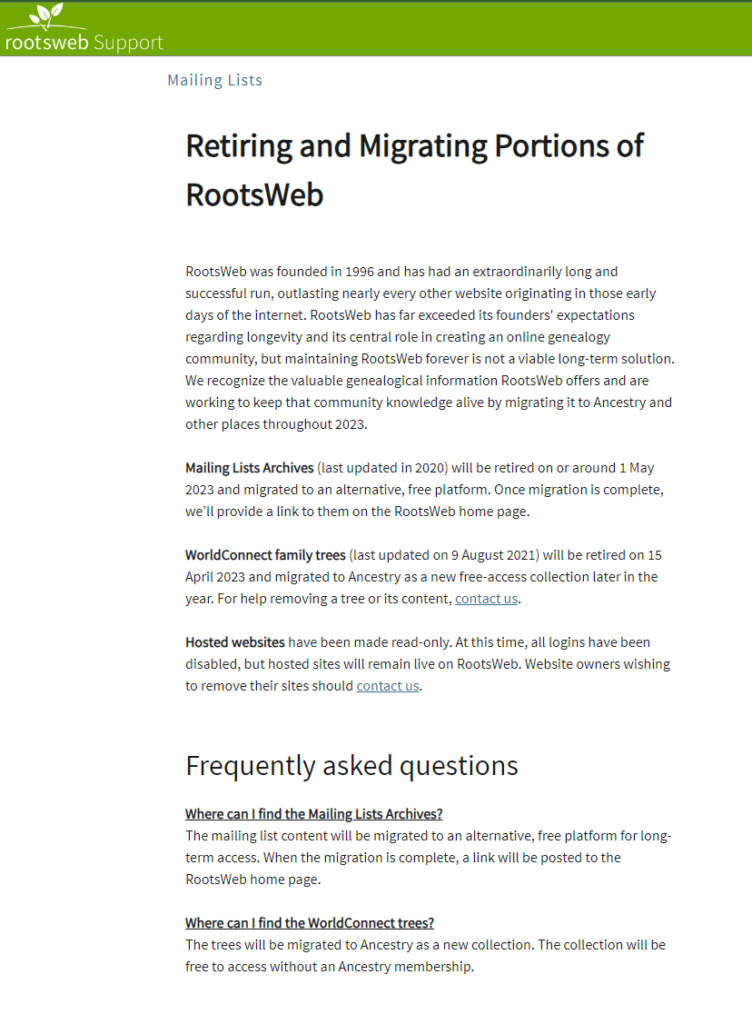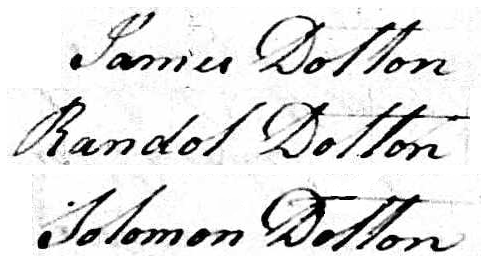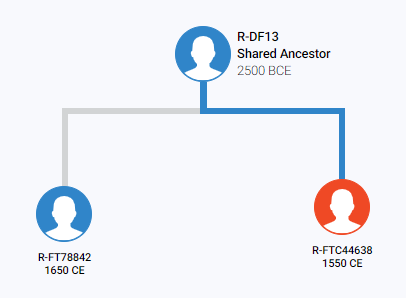In the last post, we followed the trail of Henry G. Dutton (born 1830 in South Carolina, died 1911 in Morgan County, Alabama), his father, Thomas C. Dutton (born about 1797 in Elbert County, Georgia, died after 1860), and his father, Thomas Dutton Sr. (born about 1770). We traced the family back to Elbert County, Georgia, on the state line with South Carolina, with ancestors that were born in both states, suggesting that they were moving back and forth easily.
And we found a positive Y-DNA match between a descendant of Henry G. Dutton and a descendant of another Dutton family with origins in South Carolina — the family of John Dutton (born about 1775 in South Carolina, died about 1858 in Arkansas), who was the father of James Cass Dutton (born about 1808 in Virginia, died 1867 in Arkansas) and Rev. Moses P. Dutton (born about 1816 in Virginia, died 1897 in Arkansas). Last time, I argued that this Y-DNA lineage has the marks of being a very old Dutton family with probable origins in Cheshire, England. This time, I will return to the more recent ancestry of the family — which possibly ties into the Jeremiah Dutton family of South Carolina.
Writing this article has been both fascinating and frustrating. It takes me back some twenty-five years, when Sue Dutton Rodgers and a group of other genealogists were working on Jeremiah Dutton and had their own RootsWeb mailing list. This effort led me to digging through my oldest email archives. Now, due to simple time and mortality, so many of those people are no longer with us. But also, due to negligence and mismanagement, so much of their research is also lost. So as much as I will attempt to reconstruct it, I fear I may resort to starting over from scratch.
RootsWeb: Lamenting what is lost
In the early days of my researching Duttons, I got in touch with a lot of wonderful cousins via email, and we formed the Zachariah Dutton Mailing List. At first, we did this just by copy-and-pasting the recipient list, but that became quite messy, and after a year or so, we moved to a RootsWeb listserv. There was already a DUTTON listserv, but for different reasons — partly youth and insecurity — I felt like we didn’t “fit in” with the other, mostly northern or British, Duttons. So DUTTON-ZACHARIAH was born.
There were also a number of other Duttons with southern connections who joined our list. Sue Dutton Rodgers was one of the most active and helpful. She came from the Duttons of Arkansas, and claimed descent from Jeremiah Dutton of South Carolina. For a long time, she and others were trying very hard to connect Jeremiah Dutton to Zachariah Dutton. I never saw any evidence of a connection; despite both showing up in southern states, there was no evidence they had ever been in the same place. If I was brusque in rejecting the possibility, of if I made others feel like they didn’t “fit in” with our group, I deeply regret it.
Sue Rodgers ending up starting her own mailing list, the DUTTON-JEREMIAH listserv. I’m sorry to say, I’m not sure I ever even subscribed to it. After a number of years, in about 2007, I heard that she renounced her earlier research and rejected Jeremiah Dutton as being her ancestor. If I ever knew why, I didn’t keep any record of it.
Now it is 2024, twenty years later. RootsWeb is gone. The mailing lists are gone. Those people are gone. And worst of all, the archive of our lists is gone. Ancestry (which bought RootsWeb way back in 2000) finally shut down the mailing list archive last year. They did allow it to be crawled by the Internet Archive before they dismantled it, but somehow, neither DUTTON-ZACHARIAH nor DUTTON-JEREMIAH made it into the archive.
Ancestry’s mishandling of the RootsWeb archives — both the mailing list archives and the WorldConnect trees — angers me a great deal. They claimed that “maintaining RootsWeb forever is not a viable long-term solution” — but why not? In this age of practically limitless cloud storage, how much could it have cost to host an archive of text-only data? Even if they felt the need to shut down the archive server, why couldn’t they have just put the archives into a permanent, searchable database, one among all the other thousands of Ancestry-hosted databases? What angers me the most is the attitude of Ancestry representatives I have been dealing with over the past few weeks, who have told me that being crawled by the Internet Archive fulfills their commitment to “[migrate] [the archive] to an alternative, free platform,” and that the lists’ content is now no longer their problem.
After weeks of agonized, fruitless attempts to recover the list data, I think I know what happened. As much as I blame Ancestry its abandonment, I can see how it happened that the DUTTON-Z and DUTTON-J lists failed to migrate. Somewhere along the process of migrating the archives from server to server, sometime before their ultimate dismantling, someone overlooked our lists because of the way they were listed: not under the general heading for “D” surnames, but as subheadings of DUTTON.
I believe I can reconstitute the DUTTON-ZACHARIAH archive myself from my own email archives — I’ve never deleted anything — but the DUTTON-JEREMIAH list appears very likely to be permanently lost. And that sickens my heart both as an historian and archivist, and as a working genealogist. Because now I am not able to read Sue Rodgers’ final objections against Jeremiah Dutton.
Sue’s email address was bouncing by 2012 when I tried to contact her. Googling her name turns up very little, only a few old queries, none later than 1999. But it also does not turn up an obituary or any other trace of her. She was retirement-age in 1998, living in Eureka Springs, Arkansas, so I think she must almost surely be gone by now.
I’ve been contacting other researchers of the Jeremiah Dutton family, trying to reconstruct what happened, but most of them still claim him. I would have hoped that I could learn from Sue’s past research, and not make the same mistakes she made — or else redeem her mistakes, and prove he is her ancestor after all — but alas, it seems I may never know her reasons, and have to let that go.
Jeremiah Dutton, Daniel Dutton, and Sue Dutton Rodgers
I did a DNA test last year on M.S.D., a descendant of:
- Thomas Dutton (born about 1770, probably in South Carolina, died after 1840 in Georgia)
- Thomas C. Dutton (born about 1797 in Elbert County, Georgia, died after 1860 in Blount County, Alabama)
- Henry G. Dutton (born about 1830 in South Carolina, died 19 Jan 1911 in Lacon, Morgan County, Alabama)
- David N. Dutton (born 4 Mar 1871 in Alabama, died 8 Jul 1928 in Lacon, Morgan County, Alabama)
- Henry G. Dutton (born about 1830 in South Carolina, died 19 Jan 1911 in Lacon, Morgan County, Alabama)
- Thomas C. Dutton (born about 1797 in Elbert County, Georgia, died after 1860 in Blount County, Alabama)
He is a match to A.W.D., a descendant of:
- John Dutton (born about 1775 in South Carolina, died after 1850 in Washington County, Arkansas)
- James Cass Dutton (born about 1808 Virginia, died about 1865 in Washington County Arkansas)
- Andrew Jackson Dutton (born 1842 in Kentucky, died 19 Mar 1921 in Coryell County, Texas)
- William Daniel Dutton (born 17 Jul 1869 in Coryell County, Texas, died 9 Feb 1948 in Coryell County, Texas)
- Andrew Jackson Dutton (born 1842 in Kentucky, died 19 Mar 1921 in Coryell County, Texas)
- James Cass Dutton (born about 1808 Virginia, died about 1865 in Washington County Arkansas)
When I first discovered this match, between descendants of John (b. 1775) and Thomas (b. ~1770), I vaguely remembered Jeremiah Dutton. But remembering that Sue Rodgers had rejected Jeremiah, I didn’t go very far with it. I wondered if John and Thomas could be brothers or cousins.
But then, in writing the recent post, I delved back into the earliest of our “old list” correspondence to read what was said then about Jeremiah Dutton — and was completely taken aback by what I read. I excerpt this 1998 message from Sue Dutton Rodgers (emphasis mine):
The first Dutton I know is mine is Jeremiah Dutton, b. abt 1750 in probably Botetourt County, Virginia; at least he is on a tax list in 1771 in that county. Jeremiah is next found buying land in 1773 in Greenville County, South Carolina, and has a brother with him, Daniel Dutton, b. abt 1735. Jeremiah had two known sons, Samuel, b. abt 1773 and my 4ggrandfather, John Dutton, b. 1774 both in S.C. Daniel had two known sons, James, b. abt 1778 and Thomas, b. abt 1780. I have lots of land records in that area, until 1797 when all my Duttons left S.C.
I don’t know where Samuel went. My John Dutton went from S.C. in 1797 to somewhere in N.C. and married Susannah Stepp whose family was in and around Wilkes County North Carolina and they went on to Scott County, Virginia, then some to Kentucky then wound up in Northwest Arkansas. Those Duttons I have down pat… well you know, sort of.
It’s Samuel Dutton, brother to my John; Daniel Dutton, brother to Jeremiah; and Daniel’s two known sons, James and Thomas, that I am theorizing went to Georgia, Elbert County, then Thomas moved on west into Northwest Georgia.
Sue knew then about this Thomas Dutton Sr. in Elbert County, Georgia. She had him on her radar. She had him connected to Daniel Dutton, brother of Jeremiah Dutton. And now I had verified a paternal connection between Thomas, supposed son of Daniel, and John, supposed son of Jeremiah.
The problem is, as the problem always has been with this family for me, is lack of verification. I’ve never seen any documentable evidence of the connections researchers claim.
Jeremiah Dutton and Daniel Dutton: Looking for the trail
So now I will go back to the sources, and attempt to put together from the bottom up what I can glean about Jeremiah Dutton and Daniel Dutton.
Early census records
The names of Jeremiah Dutton and Daniel Dutton both appear on the 1790 census, the first census of the United States, in Greenville District, South Carolina:
- Jeremiah Dutton
- 3 free white males 16 and over
- 3 free while males under 16
- 3 free white females
- Daniel Dutton
- 2 free white males 16 and over
- 1 free white male under 16
- 2 free white females
By the 1800 census, both men were gone. Only one man clearly identified as a Dutton was listed in the whole state of South Carolina in 1800, in Abbeville District:
- John Dutton
- 1 free white males aged 26 to 45
- 1 free white female aged 16 to 26
There were several men on the 1800 census in Greenville District whose name was spelled Dotton. Randol and Solomon Dotton were listed as men between ages 26 and 45; James Dotton was either aged over 45, or was aged between 16 and 26 and had a man over age 45 living with him. These three men were listed on successive pages (23A, 23B, 24A), but are no neighbors on those pages who definitely be correlated with the neighbors of Jeremiah Dutton or Daniel Dutton in 1790.*
* Since it seems, as I discovered toward the end of this article, that Jeremiah Dutton sometimes had his name spelled Dolton or Dottey, it appears likely that these Dottons may belong to Jeremiah. Additional sources would be needed to make a definitive connection.
Most researchers presume that the John Dutton on the 1800 census in Abbeville District is the same John Dutton who went to Arkansas and was the father of James and Moses. The ages, at least, appear roughly to fit. His wife Susanna was about ten years younger than he was, by the 1850 census. But beyond that, the census does not give a lot to work with.
Land grants

Jeremiah Dutton received a land grant from the State of South Carolina, 240 acres that were surveyed on 9 Jul 1784 and granted on 3 Oct 1785. The survey and later deeds describe the land as being on the South Tyger River, near Parson’s Station. At the time of the survey, the land was in the Ninety-Six District. According to deeds, it was later in Greenville County.
The Tyger River meanders across the whole state of South Carolina. I’m not enough of an expert on South Carolina geography or watercourses to identify very well where this land was. Later deeds of parcels of the land, into the 1830s and later, reference the original land grant to Jeremiah Dutton, it would probably be possible to identify exactly if one was determined.
The South Carolina Archives index also contains a reference to a 1775 memorial (record of a previous land transaction) in which Jeremiah Dutton summarized a chain of title on 200 acres on land “on the Pacolet River,” originating in a 1772 land grant to John Kirkconell. This land also seems to be in the old Ninety Six District, or possibly in the old Tryon County, North Carolina. But it definitely seems likely to be the same person, showing that Jeremiah was in South Carolina at least as early as 1775.
Deed records
Deed records in Greenville District shed a small amount of light; the most I have encountered so far in the search for Jeremiah Dutton. I find these records:
- 24 Feb 1787, Jeremiah Dutton and wife Sarah to George Salmon, 240 acres, from Jeremiah Dutton’s 1785 S.C. grant. [1]
- 24 Feb 1787, Jeremiah Dutton and wife Sarah to John Childress, 240 acres, from Jeremiah Dutton’s 1785 S.C. grant. [2]
- 20 Jun 1793, Jeremiah Dutton to Samuel Dutton, “my beloved son,” for whole of his remaining estate. Samuel Dutton then voided the deed in August. [3]
- 4 Aug 1794, Jeremiah Dutton to Robert Carter, 300 acres. [4]
- 25 Aug 1795, Daniel Dutton to John Stanford, 185 acres, from Daniel Dutton’s 1788 S.C. grant. [5]
The first two deeds appear to account for the sale of all Jeremiah Dutton’s 1785 land grant. But evidently he had also purchased other land. The South Carolina Archives has no record of a 1788 land grant to Daniel Dutton, but the fifth deed suggests that there was one.
The only genealogical information that is clear from any of this, is that Jeremiah Dutton’s wife was Sarah Dutton, and that Samuel Dutton was a son of Jeremiah Dutton. Daniel Dutton appears to have been a close relative of Jeremiah Dutton, possibly a brother, but perhaps just as possibly an older son.
Conclusions, at first
I don’t see any good reason, from the available sources, to conclude that John Dutton (b. ~1775) was the son of Jeremiah Dutton. Or that Thomas Dutton (b. ~1770) who went to Elbert County was the son of Daniel Dutton. And I guess this has been my problem with this family all along. There has been too much staked on speculation and too little evidence to support it.
For some reason Sue Dutton Rodgers came to the above conclusions — that John Dutton was the son of Jeremiah Dutton and that Thomas Dutton was the son of Daniel Dutton. Did she have sources to support either? She never showed them back then, and there’s no evidence that anybody has them now.
For some reason, too, Sue ended up renouncing the supposed connection of John to Jeremiah. Did she have good reasons for that? Was it that she realized there was no proof, or did she find some evidence positively against it?
All of this is ultimately speculation upon speculation. But in the course of writing this article, I’ve gradually pieced together why it was Sue rejected Jeremiah Dutton. Around 2007, researchers seized on the conclusion that Jeremiah Dutton was actually a Doty.
The Doty moment
It’s now ubiquitous in online trees: Jeremiah Dutton of Greenville District, South Carolina, was actually Jeremiah Doty, son of John Doty, and descendant of Edward Doty of the Mayflower (who sometimes spelled his name Doten). Nevermind that Jeremiah Dutton was supposedly born in Botetourt County, Virginia, about 1749, while his supposed father John Doty (1709‒1757) was born, lived his whole life, and died in Middlesex County, New Jersey. Researchers claim both facts in the same tree and never notice any contradiction. Nevermind, either, that Doty is a well-researched family and the published genealogies don’t give a son named Jeremiah for this John Doty.
I don’t know who came to this Doty conclusion in the first place — that is probably lost in the flotsam of RootsWeb too — but it appears that it happened around 2007. Most researchers now seem content to accept that Jeremiah Dutton was Jeremiah Doty, and his descendants became Duttons, with no further explanation. But I think discovering that Jeremiah was a Doty and not a Dutton was enough for Sue Dutton Rodgers to decide that Jeremiah was not her ancestor. Her family was Dutton, not Doty!
She was right. Her family is definitely Dutton, and not Doty. The Y-DNA is absolutely, conclusively not a match to the Edward Doty line. Edward Doty’s Y-DNA haplogroup, as confirmed by at least three descendants, is R-FT78842, subclade of R-L21 > R-DF13 > R-ZZ10_1. The Edward Doty paternal line has not shared a common paternal ancestor with the line of John Dutton (b. ~1775), of haplogroup R-FTC44638, since R-DF13, about 2500 BCE.
So either Sue’s John Dutton was not the son of Jeremiah Dutton, or Jeremiah Dutton was not a Doty. Or maybe both. But we now know for a fact that Sue Dutton Rodger’s line, from John Dutton (b. 1775 in S.C.) was not Doty, but Dutton.
Getting back on track
Research on the ancestry of the family of John Dutton (b. 1775) and his descendants in Arkansas seems to have gotten off track some twenty years ago with this conclusion that Jeremiah Dutton was a Doty. Below, I will reexamine this and related conclusions in an effort to bring a better focus to the task.
There are at least three separate issues at stake:
- Was John Dutton (b. 1775) a Doty? We can now say, categorically and conclusively, no, he was not.
- Was Jeremiah Dutton a Doty? That may be complicated. But I at least see no evidence that he belonged to the Edward Doty line.
- Was John Dutton the son of Jeremiah Dutton? This answer, too, is unclear.
Was John Dutton (b. 1775) a Doty?
John Dutton’s father and paternal ancestry was Dutton, not Doty. Not only does his haplogroup show indications of having roots in Cheshire, England, but his descendants match descendants of another contemporary Dutton line, that of Thomas Dutton (b. ~1770). Additionally, testing of multiple descendants of Edward Doty, the Mayflower immigrant, have shown him to be a different, unrelated haplogroup ([1], [2], [3]). There was talk of doing this DNA testing twenty years ago and awaiting its results. Then there was no more mention of it. Why no one corrected the course with the Duttons all that time ago is baffling.
It is at least conceivable, I add as a caveat, that the John Dutton–Thomas Dutton line could have been a Doty line, one not otherwise documented — but it is decidedly not the line of Edward Doty of the Mayflower. Read below, “Was John Dutton the son of Jeremiah Dutton?”, for more discussion.
Was Jeremiah Dutton a Doty?
Years ago, Sue Dutton Rodgers concluded (in disgust, it appears) that Jeremiah Dutton, since he was a Doty, was not her ancestor. But was Jeremiah Dutton a Doty? I do not know all the arguments for claiming he was a Doty in the first place, but I will do my best to reconstruct them.
In order to show that Jeremiah Dutton was a Doty, one would need to show that the man Jeremiah Dutton in South Carolina at some time spelled his name Doty. There are, at least, two references in Roster of South Carolina Patriots in the American Revolution (by Bobby Gilmer Moss, 1994) to a man named Jeremiah Dolton who “served in the militia under Col. Roebuck after the fall of Charleston,” and one named Jeremiah Dottey who “lost a horse on the Cherokee Expedition; later, he served as a captain under Cols. Thomas and Roebuck.”
That’s a start. Were Jeremiah Dolton and Jeremiah Dottey the same person? Possibly. They did, at least, both serve under Col. Roebuck. Both men, it seems, were illiterate — as was Jeremiah Dutton. And this may be a clue: Jeremiah Dolton and Jeremiah Dutton both signed “their mark” with a similar sign approximating the letter “D”. (See S.C. Audited Accounts 1970 and 1992.)


There was also a Sarah Dottey, apparently associated with Jeremiah Dottey, who was paid for two hogs she gave to the militia (AA 1992A).
William Warren, later of Green County, Kentucky, attested in his declaraton for a pension (W3056) that “he entered the service of the United States in the District of 96 [Ninety-Six] State of South Carolina … in the latter part of the year 1776 or first of the year 1777 … under the command of Captain Jeremiah Doty [Jeremiah Dottey] who was under command of Col. Thomas [John Thomas].” A list of captains places Captain Jeremiah Dottey in the First Spartan Regiment.
So this Captain Jeremiah Dottey was indeed based in Ninety-Six District, in or near Spartanburg. This is beginning to look like a strong argument that Jeremiah Dottey in the Revolution may have been the same person as Jeremiah Dutton in later Greenville County.
On the other hand, we have, from the land grant and deed records, evidence that Jeremiah Dutton was living in South Carolina, and spelling his name Dutton, as early as 1775. In my perusal of the deed Greenville deed records, I can find no other reference to anyone using the name Jeremiah Doty or similar.
I guess, perhaps the key, now that I arrive here at the bottom, is that Jeremiah Dutton couldn’t spell. All the records we have of him — whether it’s in the land grants, the deed records, or, assuming it’s the same guy, the Revolutionary records — are somebody else spelling his name for him.
The proponents of “Doty” in 2007 seem to have assumed that because the earlier, Revolutionary records say “Dottey” or “Doty”, this must be the man’s “true” name. But it could just as well have gone the other way: He could have been a Dutton, and his name was inadvertently spelled “Dottey” or “Doty.” We cannot really draw conclusions what his “original” name was, without additional data that isn’t there.
What I think I can say with some certainty, though, is that the connections researchers have tried to make between Jeremiah Dutton and the Edward Doty family are not well supported. The Edward Doty family is fairly well documented, even having its own lineage society; but its descendants in the eighteenth century don’t appear to have left New England, New York, or New Jersey, while Jeremiah Dutton supposedly came from Virginia.
One tree that I find, as mentioned above, attempts to connect Jeremiah to John Doty (1709‒1757) who married Ocy Skillman; but the published genealogy does not include a son named Jeremiah for them.
I happened to find that a different John Doty (b. 1712), a cousin of the first two pages later in the genealogy, did have a son named Jeremy (Jeremiah) Doty:

Jeremy (Jeremiah) Doty; not m.; d. Somerville, N. J. Was prob. a Revolutionary solider, in the same company as his father.
But once again, this John Doty lived his whole life in New Jersey. The author had reason to state that John’s son Jeremy Doty (1) never married, and (2) died in Somerville, New Jersey. This Jeremy Doty was also in the same Revolutionary company with his father, in New Jersey — not in South Carolina in 1775 as we have shown Jeremiah Dutton was.
Could Jeremiah Dutton be a Doty? Yes, it’s possible. There is at least enough evidence to note that he may be the same person as Captain Jeremiah Dottey in the Revolution. But there is not enough evidence to connect him to the family of Edward Doty of the Mayflower.
Was John Dutton the son of Jeremiah Dutton?
I feel I can say with some conviction that John Dutton (b. 1775) was a Dutton, not a Doty. This conviction is based heavily on the evidence of Y-DNA.
I have not found any direct evidence tying John Dutton to Jeremiah Dutton. The Greenville deeds name Samuel Dutton as a son of Jeremiah Dutton, but not John Dutton. The 1790 census indicates that Jeremiah Dutton may have had as many as five sons and two daughters, but we have no direct evidence by which to name them.
John Dutton first appeared on the 1800 census in Abbeville District, South Carolina. Abbeville District was, with parts of Greenville, at one time part of the Ninety-Six District, but it was not the same place, and was separated by some forty or fifty miles, measuring from the county seats.
So at the end of all this, I have to say that I don’t know. And that’s okay. Genealogists are often too eager to jump to conclusions without supporting their arguments. It’s always better to state what you know for sure.
And with this DNA evidence, we know for sure that John Dutton (b. 1775) had a relative, Thomas Dutton (b. ~1770), from the same paternal line. By one estimate, it appears the two may have shared a common paternal ancestor as recently as about 1755 — in which case, they very well could be brothers or first cousins. By another, supposedly more advanced estimate, they could have shared a common paternal ancestor any time within the past 500 years.



Sue Dutton Rodgers stated that John Dutton was the son of Jeremiah Dutton and Thomas Dutton was the son of Daniel Dutton, Jeremiah’s brother. It sure would be nice to talk to her again, and find out why she thought that. But no records that I have found present that so plainly. But neither do any contradict it.
So … maybe? John Dutton could be the son of Jeremiah Dutton. If he were, then considering the DNA, it would mean that Jeremiah Dutton was not a Doty paternally, and may have just inadvertently been called that in Revolutionary records because of his illiteracy. He could have had Dutton ancestors and a Dutton line going back to Cheshire that has yet to be discovered. Or, conceivably, Jeremiah could have been a Doty, just not one from the Edward Doty Mayflower line. No other known Doty line appears to match the John Dutton‒Thomas Dutton line within a genealogical timeframe. Or, John Dutton may not be the son of Jeremiah Dutton at all, and John’s appearance in a county adjacent to where Jeremiah lived may be a red herring and an unrelated coincidence.
Conclusions, at last
This has been an agonized post to make, and I hope it hasn’t been nearly as hard to read as it was to write. When I started it, I had hoped to put more pieces together than I ultimately did.
For all the hope and promise of connecting John Dutton (b. 1775) to Jeremiah Dutton of South Carolina, as Sue Dutton Rodgers tried to do years ago, there still does not appear to be enough solid documentation to do so. Jeremiah Dutton left only a few records, and none of them connect to John Dutton.
Those years ago, it seems Sue may have abandoned Jeremiah Dutton when researchers began to argue that Jeremiah Dutton was in fact a Doty. There does seem to be solid evidence that Jeremiah Dutton, during his Revolutionary service, went by the name Jeremiah Dottey, a name sometimes spelled Doty. But arguments to connect Jeremiah Dutton to the line of Edward Doty of the Mayflower are not well supported.
The Y-DNA is clear that the line of John Dutton (b. 1775) and his descendants in Arkansas, which is the same paternal line as that of Thomas Dutton (b. ~1770) and his descendants in Georgia and Alabama, is not the same line as Edward Doty.
In the end, we have a dilemma. One of the following two statements is true:
- John Dutton is the son of Jeremiah Dutton, and Jeremiah Dutton is in fact paternally a Dutton, connecting to a Dutton line that goes back to Cheshire.
- John Dutton is the not the son of Jeremiah Dutton, in which case we can’t really say anything about Jeremiah Dutton’s paternal line at all.
In my own tree, I’ve simply linked John Dutton to Thomas Dutton as “sharing a common paternal ancestor,” even though the distance to that ancestor is not known for sure. It is my hope that with additional Y-DNA testing, we can find more lines that match them, and gradually put the pieces of this puzzle together.






